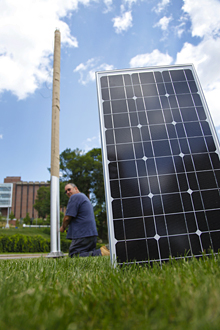Sustainability Fund solar, bike programs expand
New lights illuminate campus entrance, harness and store energy
 Photo/Mike Lovett
Photo/Mike LovettInstallation of solar lights on campus
The first year of the Brandeis Sustainability Fund (BSF) brought in solar lights, a larger bike-sharing program, worm-composting, greenhouse covers and a Smart Energy Dashboard. The seven solar lights, which greet visitors at the main entrance, were recently installed.
The $50,000 fund was created as the result of a campus-wide referendum in which students levied on themselves a $15 per-year increase in the Student Union activity fee. Ideas for sustainability projects are student generated.
“The solar lights have a good payback,” says Janna Cohen-Rosenthal, sustainability coordinator at Brandeis. “I also think that welcoming everyone to campus with sustainable lighting is wonderfully symbolic.”
The new solar lights are off-grid, meaning energy that is generated but not used is stored in batteries, not tied into the central public system.
The 43-watt units are replacing 175-watt metal halide fixtures. They are projected to save 6062 kilowatt-hours annually, close to $1,000 and will eliminate 866 pounds of carbon from the atmosphere.
The Department of Facilities Services paid for two-thirds of the cost and the BSF covered the remainder of the cost premium to use solar versus traditional technology.
“We think it’s spectacular that the students came up with the idea,” says Peter Shields, associate vice president of the department of Facility Services. “Having the support of Mark Collins made a statement for the university to become more sustainable and is also a celebration of student creativity.”
Joseph Castronovo, electrical supervisor, says that to install the lights properly, his team first had to put up a test pole to ensure the light would disperse well. That is because the new solar system emits more direct beams. The pole size was increased from 12 to 16 feet, new stanchions, pipes and bars were replaced, and the heads were rewired. An emergency back-up was installed just in case sufficient sunlight is ever unavailable for an extended period of time.
The entrance lights are the second recent solar installation on campus. More than 1,200 high-efficiency photo-voltaic modules atop Gosman Sports and Convocation Center became operational in February 2010. That 271 kilowatt system is one of the largest solar photovoltaic systems in the state.
Additional projects that came out of the sustainability fund include:
DEIS Bikes, short for Brandeis Bikes, is a bike-sharing and rental program that began in 2009. This year the BSF purchased 35 bikes that were rented out for the semester and five for the Daily Free, meaning they can be borrowed for the day with an ID card.
“The student coordinators saved most of the bike lottery spots for off-campus students,” says Cohen-Rosenthal. "As a sustainability project, the bikes were really meant to be a commuting option.”
Vermiculture Project and Green Living residence
Sure worms are great for fishing, but they’re also key players when it comes to composting.
“The idea was to not solely to have worm-composting, but to further engage a freshman floor in a greater level of sustainability efforts by offering a new option,” says Cohen-Rosenthal.
Two verimiculture bins were installed; one in The Village and one in Massell Quad. Programming lectures were offered and the composting began. Since the Patchwork Garden is next door to the Massel Quad, fresh earth was welcomed. Additional outdoor compost bins are maintained by the EcoReps and Usdan and Sherman commercially compost.
“For the first time this coming fall there will be a new environmental-themed floor in Massell,” says Cohen-Rosenthal. Incoming freshman that applied were accepted in June.”
Community Garden Greenhouse Covers
One way to extend the growing season outdoors is with greenhouse cover, which allows the season to begin earlier and end later. The BSF purchased one for the greenhouse located behind Massell along with a few gardening supplies. People who spend time volunteering in the gardens are welcome to share in the bounty.
“The main purpose of the garden is to educate people about planting and local food,” says Cohen-Rosenthal. “Literally getting your hands dirty is the best education.”
Smart Energy Dashboard
The building dashboard was the most expensive project. The technology from Lucid Designs tracks energy use in real-time and will act as a both a teaching tool and a monitoring system. The Smart Meter Project came with a price tag of $26,000 and will monitor Massell Quad and The Village. Results will be posted on a big screen in the Shapiro Campus Center. A separate technology called WeGoWise will monitor Charles River on a monthly basis.
“Each of the apartments are separately metered, which is a gold-mine for energy behavior,” says Cohen-Rosenthal.
Visit the campus sustainability site to learn more or to get involved.
Categories: General






